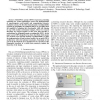Free Online Productivity Tools
i2Speak
i2Symbol
i2OCR
iTex2Img
iWeb2Print
iWeb2Shot
i2Type
iPdf2Split
iPdf2Merge
i2Bopomofo
i2Arabic
i2Style
i2Image
i2PDF
iLatex2Rtf
Sci2ools
124
click to vote
VLSI
2010
Springer
2010
Springer
A design workflow for dynamically reconfigurable multi-FPGA systems
Multi-FPGA systems (MFS's) represent a promising technology for various applications, such as the implementation of supercomputers and parallel and computational intensive emulation systems. On the other hand, dynamic reconfigurability expands the possibilities of traditional FPGAs by providing them the capability of adapting their functionality while still running to cope with runtime environment changes. These two research directions are merged together in this work, that describes a methodology for designing dynamic reconfigurable MFS's. In this paper a novel MFS design flow has been described, which makes use of blocks reuse through dynamic reconfigurability to make the implementation of large systems feasible even on multi-FPGA architectures with strict physical constraints. Functional to this goal is the development of an algorithm for the extraction of the isomorphic structures of a circuit that extensively exploits the hierarchy of the design.
Computational Intensive Emulation | Dynamic Reconfigurability | Dynamic Reconfigurable Mfs | Software Engineering | VLSI 2010 |
Related Content
| Added | 23 May 2011 |
| Updated | 23 May 2011 |
| Type | Journal |
| Year | 2010 |
| Where | VLSI |
| Authors | Alessandro Panella, Marco D. Santambrogio, Francesco Redaelli, Fabio Cancare, Donatella Sciuto |
Comments (0)

